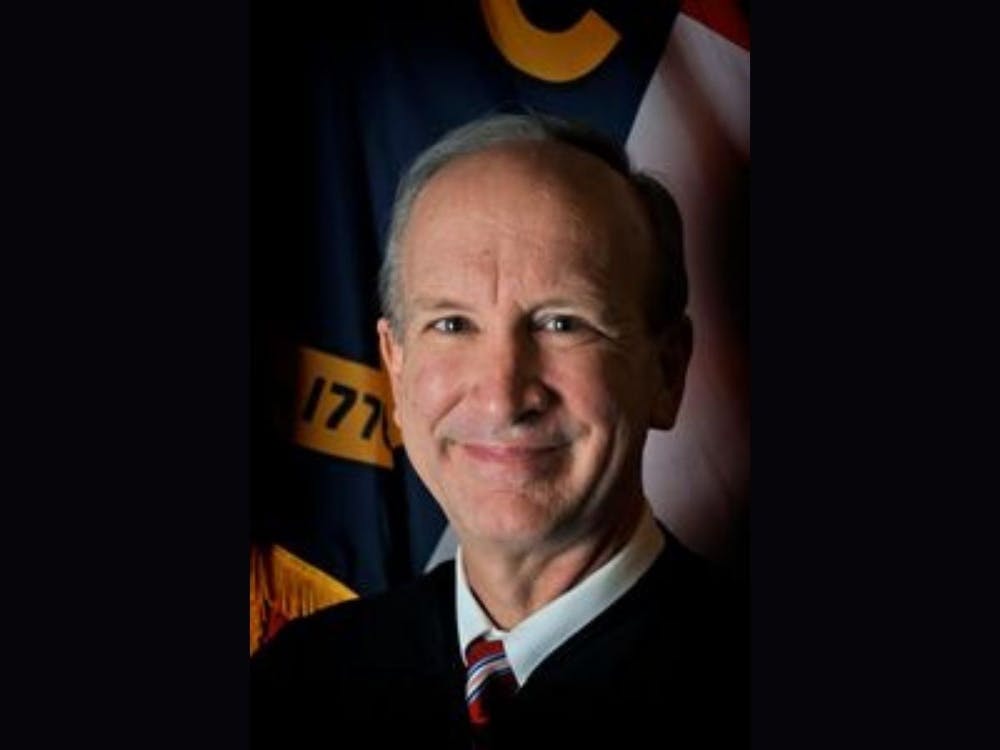Paul Newby, Trinity ’77, defeated former Chief Justice Cheri Beasley in last year’s election for chief justice of the North Carolina Supreme Court by a mere 401 votes out of 5.4 million total votes cast. Democrats had held a 6-1 majority on the state’s highest court, but that majority narrowed to 4-3 after the November elections.
After his swearing-in, Newby began work towards his campaign promise of reopening the state court system. On Jan. 14, Newby issued an order providing local authorities with the choice to reopen, a significant shift from Beasley’s mandated shutdown of the courts. The order is a statement of intent from Newby, who says his greatest concern lies with ensuring equal justice under the law for all residents of the state.
A North Carolina native, Newby holds a Bachelor of Arts degree in Public Policy Studies from Duke University and a Juris Doctor from the University of North Carolina School of Law. A Republican, he describes himself as a constitutional and historical scholar who identifies with the political theories of the American founders.
The Chronicle spoke to Newby about his transition to chief justice and time as a Duke student.
This interview has been edited for length and clarity.
The Chronicle: Describe your thoughts after winning such a closely contested election for chief justice
Paul Newby: I’m a student of history. Little did I know I’d be making it! From election night until there was a concession, my wife Macon and I had a spiritual journey of prayer, asking for integrity in the election process. As a person of faith, I understand that outcomes are in God’s hands. Reflecting back on that experience, I see that truly every vote matters. I am humbled and grateful to have the opportunity to serve as the 30th chief justice of our state.
TC: You often mention a commitment to fairness in the courts. What do you see as integral to ensuring such fairness for all citizens of North Carolina?
PN: Public trust and confidence are foundational aspects of our government. Properly assessing our legal system for fairness and suggesting appropriate changes when necessary is vital. My personal experience within our system is that we are not perfect, but we have incredibly talented individuals whose primary goal is equal justice for everyone. I appreciate the desire of our stakeholders to consistently improve our delivery of justice.
TC: What do you foresee being the biggest issues or questions you will have to tackle as chief justice?
PN: Our first challenge is to fulfill our state constitutional mandate: The courts are to be open and justice shall be administered without favor, denial or delay.
Local stakeholders are in the best position to assess the ongoing situation and determine how and when to restore local courts to full operation. During this pandemic, we’ve innovated with the expanded use of technology. We hope to take what we’ve learned and continue innovating even after the pandemic subsides. For example, the judicial branch will be moving forward with the transition to our statewide electronic case management system, eCourts, by beginning pilot programs this summer.
Included in our constitutional mandate is that justice shall be administered without favor: equal justice for all. We must build public trust and confidence that our judicial branch administers justice fairly to everyone. Further, our mandate also requires us to administer justice without delay. We must address the backlog of cases caused by the pandemic—justice delayed is justice denied.
TC: What was one of your favorite experiences at Duke?
PN: I thoroughly enjoyed my Duke experience and grew from my interactions with so many bright, intelligent classmates from all over the country. As the son of a schoolteacher and linotype operator, I was honored to have the privilege of attending Duke. My advice is to take full advantage of the significant opportunities available at and through Duke.
TC: How did Duke shape the future of your career in public service?
PN: I majored in public policy studies and was fortunate to have had three separate internship experiences which helped direct my career toward public service. I first encountered the practice of law when I interned with the Public Defenders’ Office in High Point/Greensboro. During the bicentennial of our nation’s independence, I interned in the Office of the Chief Justice at the Supreme Court of the United States. Writing articles and speeches about the country’s founding helped me better appreciate our fundamental rights and the role of government. Finally, I participated in the Federal Executive Institute in Charlottesville, Virginia, which allowed me to interact with seasoned federal executives.
TC: Mentoring the next generation appears to mean a lot to you. What do you hope to pass along, and where did that passion for mentorship develop?
PN: As a Boy Scout, I was taught to leave the campsite better than I found it. I’ve tried to use the same approach during my service on the Supreme Court since 2004. I didn’t become a justice, and now chief justice, without help along the way. In the same manner, I want to provide help to young people.
Get The Chronicle straight to your inbox
Signup for our weekly newsletter. Cancel at any time.

